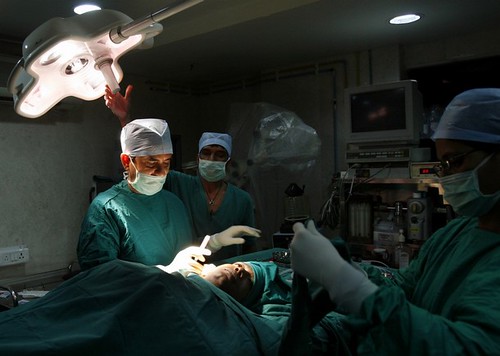Eco-tourism has been around for some time, and the future will certainly include space tourism (eventually). Now there’s a new kind of tourism: medical tourism. A company in Wisconsin is actually encouraging people to seek medical treatment outside the U.S. — and they’ll pay for it. Talk about earning some miles:
Until now, however, the movement has largely been fueled by patients paying out of pocket. Health insurers and corporations have stayed on the sidelines, talking endlessly about whether to get involved and, if so, how. There’s reason to be cautious. How can the quality of care abroad be guaranteed? What if an employee has a surgical complication after coming home?
But the potential savings for employers are too large to be ignored forever, and Serigraph, which has about 1,200 employees worldwide and slightly fewer than 1,000 in the United States, is taking the plunge. The pilot program will be administered by Anthem Blue Cross and Blue Shield of Wisconsin, an affiliate of WellPoint, the largest U.S. health insurer in numbers of members (and the originator of the Serigraph initiative). Employees needing the following procedures will be covered:
- Hip replacement or resurfacing
- Knee replacement
- Heart bypass surgery
- Heart valve repair or replacement
- Spinal fusion
- Prostate surgery
Employees will be treated at two Apollo Group hospitals, in Bangalore and New Delhi, both accredited by the Joint Commission International. An Anthem case manager will steer patients through the process, including managing medical complications should they occur.
In fact, U.S. News & World Report published a piece on the topic last month.
There’s another type of tourism getting attention lately: drug tourism. Editors were overdosing on puns — starting with the mayor of Roosendaal, Michel Marijnen — with a story sure to get our attention.
The Times had “Too many trips by drug tourists strain Dutch Tolerance”…
Faced with outrage from residents about rowdy behaviour, Roosendaal’s Mayor, Michel Marijnen, wants to close the town’s four coffee shops but is being hampered by civil rights laws.
Like many Dutch “coffee shops” the Liberty II boasts a wide range of marijuana strains, from Amnesia through K2 to Hollands Glorie, sold openly in joints and small amounts over the counter.
Even though it is tucked away in a side street in the sleepy town of Roosendaal, its location near the southern Dutch border has made it a magnet for drug tourists who arrive in their thousands every week from across northern Europe.
…and The Independent’s “Dutch plan to weed out criminals.”
The Netherlands, famed for having one of Europe’s most tolerant policies on soft drugs, allows for the possession of less than 5g of marijuana and its sale in coffee shops, but bans the cultivation and supply of the drug to these shops. The majority of Dutch mayors say this legal “back door” has spawned an illicit industry worth €2bn (£1.7bn) a year.
“It’s time that we experimented with a system of regulated plantations so we can have strict guidelines and controls on the quality and price,” Rob de Gijzel, the Mayor of Eindhoven, told the Dutch newspaper Volkskrant. “Authorities must get a grip on the supply of drugs to coffee shops.”
Control or not, the visits will continue.


